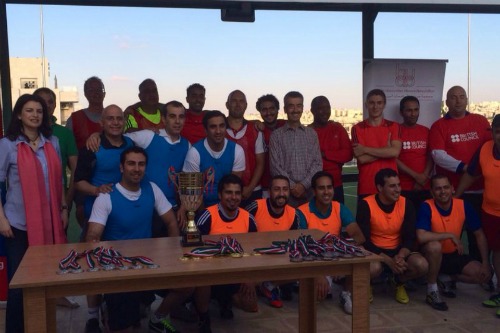11th June 2014
Football for the Fans
The World Cup starts tomorrow. For the next month the beautiful game will be played in 64 matches between 32 teams, watched by people all over the world. It will be the greatest show on earth this year.
This extravaganza will be played in Brazil, a country that lives, breathes and sleeps football. As a nation, Brazil has won the World Cup more times than any other. And their players have shown tremendous flair for the game.
You can be sure that the media will record every moment of drama. They will highlight the ecstasy of winning and the agony of defeat. It is easy to say that participation is more important than winning, but playing at this level requires hard work, rigour and discipline.

The hype will be reinforced by blanket television coverage and massive advertising. This World Cup will earn $4 billion, much of it from television rights and sponsorship deals.
Football has now become a major global industry. Over 700 million people watched the last final in 2010. Teams in England are owned by Russians, Americans and Arabs. Teams in Spain are supported in the Middle East and Asia. Teams across Europe have players from Africa and South America.
As a global game, football can build international friendship and understanding. We saw this at local level in Amman last week when we organised a tournament between the British University Alumni, the Chevening scholars, the British Council and the Embassy. It was a fun event played in the spirit of friendship. The spectators enjoyed it too.

And we must never forget the spectators. Beyond the hype of the World Cup, we must ensure that the fans come first. What brings people from all over the world to focus on 22 men kicking a ball between two posts in a field in Brazil? It is the universal culture that the fans share: a passion for a game that brings people together.
Supporting a football club is a badge of loyalty that offers fans a common sense of identity. Perhaps more importantly, the sport demonstrates the value of training, perseverance and dedication and the benefits of teamwork and co-operation.
Learning football at school or in clubs is therefore excellent preparation for young people, both girls and boys. It can teach them how to tackle their problems, block their fears and, with energy and effort, achieve their goals.
The need to focus on the fans is illustrated by the way football has changed in Britain in the last 30-40 years. In the 1970s and 1980s spectators were abandoning the game. Conditions in the stands were poor and hooliganism was keeping away families. After the disaster at the Heysel Stadium in 1985, English teams were banned from Europe.
Strong action was taken by government, the clubs and the police to stamp out hooliganism. Clubs were forced to invest millions in all-seater stadiums and exclude anyone involved in violence. The arrival of some of the best players from overseas made the game more attractive. Now, clubs like Manchester United, Chelsea and Liverpool enjoy support from all over the world. Attendance at big matches is now higher than ever.
The risk is that if clubs look to markets in Asia and elsewhere for support, they will lose touch with the local fans who have sustained them over their long histories. Big investors in clubs should not forget that each club is part of a local community.
For example, in Manchester and Liverpool, whether you support Man United or Man City, Liverpool or Everton defines which tribe you belong to. That sense of belonging is part of the fabric of the city that knits people together.
As we shall see over the coming month of the World Cup, football is central to the identity of clubs, cities and countries. As the legendary Liverpool manager Bill Shankley said: “Some people think football is a matter of life or death. I assure you, it’s much more important than that.”
Dear Peter ,
maybe I was a little bit too insecure in. re. of posting these few lines of mine to you so late . But – sorry – I first wanted to watch and finally had to suffering the 1st. match of Team GB : England vs. Italy. Result & ” blamage” now well known . But according to a Stuttgarter quote : ” ein verlorenes 1. Spiel ist noch kein verlorener Sieg/ losing a 1st. match ISN `T losing the victory”. So the boys will surely do much better next time. But most notable to me is the sentence of Mr. League Foot , above : “Football is a fantastic sport when there’s NO money in it “. I only can full agree to this statement, congratulations Sir.
Best wishes & do have a peaceful “Ruby Tuesday ” (Rolling Stones ), liebste Grüßle ond a freundlicher Dienstag , Ingo-Steven ; Stuttgart
Good post, i agree with you : football is a fantastic sport… when there is no money in it!
Thanks for the read,
Have a nice day